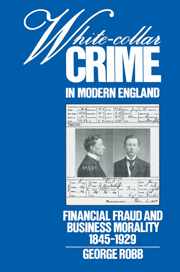Book contents
- Frontmatter
- Contents
- List of tables
- Acknowledgments
- Introduction: White-collar crime and the criminal “upperworld”
- 1 The new economy: transformation of finance and opportunities for crime
- 2 The Railway Mania
- 3 Banking and credit fraud
- 4 Stock fraud
- 5 Company fraud: promotion
- 6 Company fraud: management
- 7 Company law and the courts
- 8 Business ethics and professionalization
- Conclusion: Final considerations
- Notes
- Bibliography
- Index
8 - Business ethics and professionalization
Published online by Cambridge University Press: 08 December 2009
- Frontmatter
- Contents
- List of tables
- Acknowledgments
- Introduction: White-collar crime and the criminal “upperworld”
- 1 The new economy: transformation of finance and opportunities for crime
- 2 The Railway Mania
- 3 Banking and credit fraud
- 4 Stock fraud
- 5 Company fraud: promotion
- 6 Company fraud: management
- 7 Company law and the courts
- 8 Business ethics and professionalization
- Conclusion: Final considerations
- Notes
- Bibliography
- Index
Summary
The permissive nature of commercial law put the onus of regulation on businessmen themselves, and yet the very novelty of big business and corporate organization meant that codes of behavior and standards of business ethics were poorly articulated. Furthermore, the high risk, competitive atmosphere of the City and the Victorian ideals of rugged individualism and free trade were not receptive to set rules or restrictions – even those produced by businessmen themselves. Thus the ethical boundaries remained vague and many businessmen who would never have embezzled clients' money saw nothing wrong in insider trading, balance sheet manipulation or paying journalists for favorable reviews. Likewise, many bona fide companies – which were honestly managed and which performed legitimate services – might sometimes in the course of business exaggerate their assets or downplay their liabilities for credit purposes. In effect, many persons in the business community developed private patterns of behavior that were at odds with the professed, public morality. Novelists and journalists seized upon these inconsistencies, which they saw as representative of general financial amorality. By late century the City's negative image alarmed a number of businessmen who sought to disassociate themselves from the likes of Albert Grant and Ernest Hooley. In particular, the drives for professionalization among groups such as bankers and accountants included attempts to promote better conduct and to exclude adventurers. Professional organizations helped raise the standards of business ethics, and, by decreasing amateurism, also eliminated many opportunities for fraud.
Numerous examples have already been given of the City's bad press. Businessmen were often portrayed as predatory creatures who exploited public ignorance for personal profit.
- Type
- Chapter
- Information
- White-Collar Crime in Modern EnglandFinancial Fraud and Business Morality, 1845–1929, pp. 169 - 180Publisher: Cambridge University PressPrint publication year: 1992



